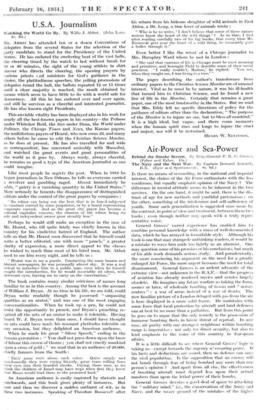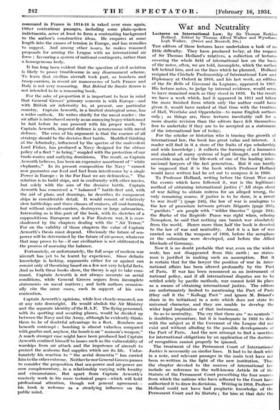Air-Power and Sea-Power
Behind the Smoke Screen. By Brig.-General P. R. C. Grove. (Faber and Faber. 15s.)
The Navy and the Next War. By Captain Bernard Acworth, R.N. (Eyre and Spottiswoode. 8s. 6d.) Is there no means of reconciling, in the national and imperial interest, the claims of the Air Force enthusiasts with the less vociferous, but equally emphatic opinion of the Navy ? The difference in mental attitude scents to be inherent in the two services. On the one hand, it might be said, there is the dis- trust of age for new methods and youthful pretensions : on the other, something of the intolerance and self-sufficiency of youth. Some such generalization is suggested once more by the contrast, in point of view and treatment, between these two books ; even though neither may speak with a truly repre- sentative voice.
General Groves' varied experience has enabled him to combine personal knowledge with a mass of well-documented data, which he has arrayed in formidable style. Although his book is one that may stampede unthinking readers, it would be a mistake to wave him aside too lightly as an alarmist. One may question some of his premises or his conclusions, but much of his able work demands serious study. And paradoxically, the more convincing his argument on the need for a greatly enlarged Air Force, the more urgent becomes the need for total disarmament. General Groves is an ardent advocate of the extreme view—not unknown in the R.A.F.—that the progress of aviation has already rendered navies and armies largely obsolete. He imagines any future warfare as taking the form, sooner or later, of wholesale bombing of towns and " nerve- centres " : a war of areas instead of a war of fronts. The now familiar picture of a London deluged with gas from the air is here displayed in a more solid frame. He maintains with some force that local protection 'by aircraft and land defences can at best be no more than a palliative. But from this point he goes on to argue that the only remedy is the possession of immense bombing fleets in latent threat of reprisal. In any ease, air parity with our strongest neighbour within bombing range is imperative not only for direct security, but also to lend emphasis to the voice of this country in European affairs.
It is a little difficult to see where General Groves' logic is
taking us—except towards the urgency of ensuring peace. If his .facts and deductions are sound, then no defence can save the civil population. Is the supposition that an enemy will not bomb through fear of being bombed any more than one
person's ? And apart from all else, the effectiveness of bombing aircraft must depend Jess upon their actual numbers than upon the lethal power of their bombs.
General Groves devotes a goo:I deal of space to attanking the " military mind," i.e., the conservatism of the Army and Navy, and the weary ground of the mistakes of the higher
command in France in 1914-18 is raked over once again. Other contentious passages, including some plain-spoken indictments, serve at least to form a contrasting background to the author's constructive ideas. He enquires at some length into the causes of tension in Europe, and has remedies to suggest. And among other issues, he makes reasoned proposals for arming the League with an international air force : favouring a system of national contingents, rather than a homogeneous body.
It has long been evident that the question of civil aviation is likely to prove troublesome in any disarmament scheme.
To learn that civilian aircraft took part, as bombers and troop-carriers, in recent air manoeuvres of both France and Italy is not very reassuring. But Behind the Smoke Screen is not intended to be a reassuring book.
For the sake of proportion it is important to bear in mind that General Groves' primary concern is with Europe—and with British air inferiority to, at present, one particular country. Captain Acworth, in a limited strategical sense, has a wider outlook. He writes chiefly for the naval reader : the air affair is introduced merely as an annoying bogey which must be laid before he can proceed with his proper work. To Captain Acworth, imperial defence is synonymous with naval defence. The crux of his argument is that the essence of all strategy should be the decisive fleet battle. Muddled thinking at the Admiralty, influenced by the spectre of the malevolent Lord Fisher, has produced a Navy designed for the obtuse policy of a fleet" in being," coupled with the protection of our trade-routes and outlying dominions. The result, so Captain Acworth believes, has been an expensive assortment of" white elephants." In its present composition the Navy "cannot now guarantee our food and fuel from interference by a single Power in Europe : in the Far East we are defenceless." The solution is to build ships, not in conformity with other navies, but solely with the aim of the decisive battle. Captain Acworth has conceived a " balanced " battle-fleet and, with the aid of plans and drawings, he describes its component ships in considerable detail. It would consist of relatively slow battleships and three classes of cruisers, all coal-burning, but without aircraft-carriers, destroyers or large submarines. Interesting as is this part of the book, with its sketches of a supposititious European and a Far Eastern war, it is over- shadowed by the chapters dealing with the "Air Terror." For on the validity of those chapters the value of Captain Acworth's thesis must depend. Obviously the future of sea- power will be determined by the future of air-power, whatever that may prove to be—if our civilization is not obliterated in the process of assessing the balance.
Fortunately, or unfortunately, the full scope of modern war aircraft has yet to be learnt by experience. Since definite knowledge is lacking, arguments either for or against can consist only of theorizing based on a few not very helpful facts. And as both these books show, the theory is apt to take com- mand. Captain Acworth is not always accurate on aerial conditians, while General Groves argues from incomplete statements on naval matters ; and both authors occasion- ally cite the same cases, each in support of his own contention.
Captain Acworth's opinions, while less closely-reasoned, are at any rate downright. He would abolish the Air Ministry and the separate identity of the R.A.F. The flying personnel, with its spotting and scouting planes, would be divided up between the Navy and the Army, although he evidently thinks them to be of doubtful advantage to a fleet. Bombers are beneath contempt : bombing is almost valueless compared with gunfire and, anyhow, the bomb is an" as..4tssin's weapon." A much stronger case might have been produced had Captain Acworth confined himself to issues such as the vulnerability of warships from air attack and the impotence of aircraft to protect the seaborne fuel supplies which are its life. Unfor- tunately his reaction to "the aerial dementia" has carried him to the other extreme. Neither he nor General Groves pauses to consider the proposition that sea-power and air-power are now complementary, in a relationship varying with locality and circumstance. But apart from Captain Acworth's masterly work in his more technical pages—which will hold professional attention, though not general agreement—. his book is welcome as a steadying influence on the public mind. •









































 Previous page
Previous page